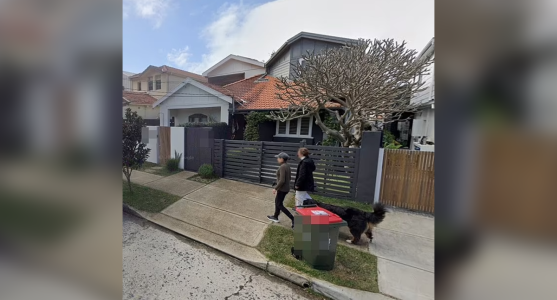Trapped in her own home: Woman's nightmare scenario when a stranger's car blocks her driveway
By
Gian T
- Replies 14
Imagine waking up, ready to start your day, only to find trapped in your home because a stranger has thoughtlessly parked their car across your driveway. This isn't the beginning of a suspense novel; it's the real-life ordeal Bronwyn Courtenay of North Bondi, Sydney, faced on a recent Friday morning.
Bronwyn's predicament began when she discovered a Subaru blocking access to her Gould Street residence. With plans for the day and responsibilities, she did what any of us would consider logical: she reached out to her local police station for assistance. However, to her dismay, the police redirected her to Waverley Council, passing the buck rather than providing her desperately needed help.
The council's response was equally frustrating. While they quickly slapped a $320 fine on the offending vehicle, they offered no solution to remove the car from Bronwyn's driveway. They suggested that she arrange to pay for a tow truck herself. This advice left Bronwyn, and no doubt many of you reading this, wondering why the council couldn't take more decisive action. Why not tow the car to a depot and leave the bill for the registered owner to settle upon collection?
As the hours ticked by, the car remained an immovable obstacle. Bronwyn's life was put on hold; she had to resort to catching buses to work and arranging alternative transportation for her daughter's sporting commitments. Beyond the inconvenience, there was a genuine safety concern. 'If there was an emergency inside my house, there's no way an ambulance could get onto my property,' she pointed out.
The street where Bronwyn lives is often tight for parking, but that's no excuse for the authorities' lack of action. Understandably, she was 'disgusted' by the council's apparent inability to help, a sentiment that many of us would share if we were in her shoes.
In a statement that might raise a few eyebrows, a Waverley Council spokesperson claimed they were 'proactive about this matter,' stating that the car was fined and towed within 24 hours of being notified. However, this claim does little to address the immediate stress and disruption caused to Bronwyn's life.
This story raises important questions about the responsibilities of local councils and the police in managing such incidents. It also highlights the need for clear procedures for residents to follow when their personal access is unjustly obstructed.
Members, have you ever found yourself in a similar situation? How did you handle it, and what should the standard protocol be for cars that block driveways? Should the cost of towing be the responsibility of the car owner who has caused the inconvenience?
 We invite you to share your thoughts and experiences in the comments below. Let's discuss the best ways to ensure that our rights as homeowners are respected and that such thoughtless acts don't disrupt our daily lives.
We invite you to share your thoughts and experiences in the comments below. Let's discuss the best ways to ensure that our rights as homeowners are respected and that such thoughtless acts don't disrupt our daily lives.
Bronwyn's predicament began when she discovered a Subaru blocking access to her Gould Street residence. With plans for the day and responsibilities, she did what any of us would consider logical: she reached out to her local police station for assistance. However, to her dismay, the police redirected her to Waverley Council, passing the buck rather than providing her desperately needed help.
The council's response was equally frustrating. While they quickly slapped a $320 fine on the offending vehicle, they offered no solution to remove the car from Bronwyn's driveway. They suggested that she arrange to pay for a tow truck herself. This advice left Bronwyn, and no doubt many of you reading this, wondering why the council couldn't take more decisive action. Why not tow the car to a depot and leave the bill for the registered owner to settle upon collection?
As the hours ticked by, the car remained an immovable obstacle. Bronwyn's life was put on hold; she had to resort to catching buses to work and arranging alternative transportation for her daughter's sporting commitments. Beyond the inconvenience, there was a genuine safety concern. 'If there was an emergency inside my house, there's no way an ambulance could get onto my property,' she pointed out.
The street where Bronwyn lives is often tight for parking, but that's no excuse for the authorities' lack of action. Understandably, she was 'disgusted' by the council's apparent inability to help, a sentiment that many of us would share if we were in her shoes.
In a statement that might raise a few eyebrows, a Waverley Council spokesperson claimed they were 'proactive about this matter,' stating that the car was fined and towed within 24 hours of being notified. However, this claim does little to address the immediate stress and disruption caused to Bronwyn's life.
This story raises important questions about the responsibilities of local councils and the police in managing such incidents. It also highlights the need for clear procedures for residents to follow when their personal access is unjustly obstructed.
Members, have you ever found yourself in a similar situation? How did you handle it, and what should the standard protocol be for cars that block driveways? Should the cost of towing be the responsibility of the car owner who has caused the inconvenience?
Key Takeaways
- Bronwyn Courtenay was outraged after police and her local council refused to tow a car blocking her driveway in North Bondi, Sydney.
- The parked vehicle prevented Courtenay from using her car and resulted in her incurring additional inconvenience and expenses.
- Waverley Council could only issue a $320 fine to the vehicle, advising Courtenay to arrange and pay for towing herself.
- Waverley Council eventually responded by finding the car and towing it within 24 hours after being notified of the incident.








